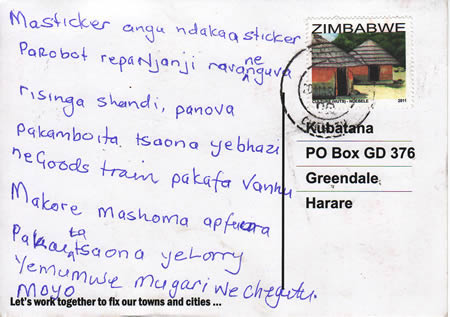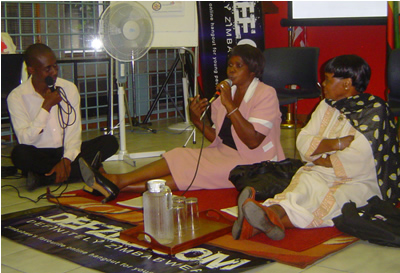Small steps in fixing Zimbabwe
Thursday, March 29th, 2012 by Bev ClarkThanks for getting involved in Kubatana’s fix this.please campaign. Your postcards are flying into our post box and we’re really proud by how proactive and engaged Zimbabweans are in wanting to make where they live better.
Here are some responses:
I have put my stickers at:
1) A non working tower light at Kaguvi because people are being robbed in that area
2) The broken sewage pipe at Umvovo because people can easily be attacked by diseases e.g. cholera
3) A stop sign which was crushed by a motor vehicle some time ago in town. I had to put the sticker because there was an accident which took place at that areaI put the stickers on:
1) A borehole (not functioning) causing shortage of water in Chegutu
2) Manhole Inspection Chamber because of odour from sewage/refuse and sewage burst pipes in ChegutuMasticker angu ndaka sticker parobot repanjani ravanenguva risinga shandi. Panova pakamboita tsaona yebhazi ne goods train pakafa vanhu makore mashoma apfuura. Pakaita tsaona yelorry yemumwe mugari wemuchegutu. (I placed my stickers on a non-functioning robot at a railway crossing. In the past there was an accident involving a goods train and a bus which killed people. Also a lorry owned by a Chegutu local had an accident at the same spot.)
I have placed stickers on:
1) A tower light between Majange shops and Urombo Primary School. The tower light stopped working long back thereby putting people’s live at risk during the night
2) A railway crossing warning sign a stones throw distance from Chevron Hotel. This is a crossing on the road to Beitbridge
3) Sewer pipes across Shakashe River between Rujeko and Eastvale. Raw sewage form these burst pipes is contaminating water that feeds a dam which is the main water source for Masvingo residents.I placed my sticker on the robots near Canaan Terminus. It’s been a long time since these robots stopped working. We need them to work.
In Masvingo a lot of broken pipes, no street lights and no traffic lights.











